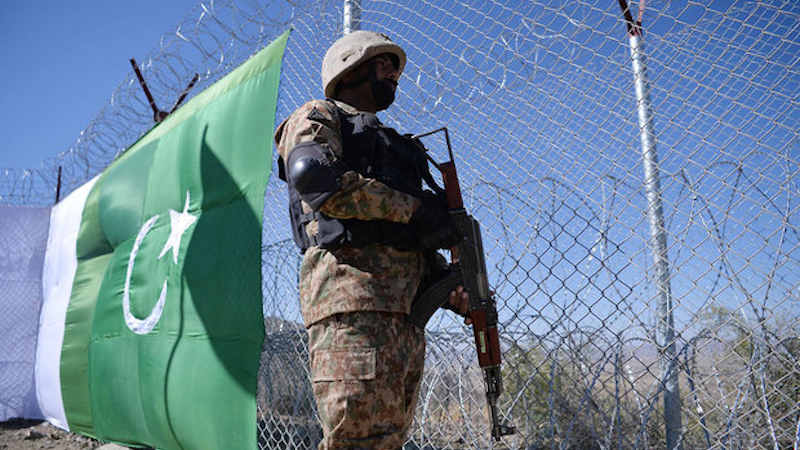
The rugged mountains lining the border between Pakistan’s Balochistan province and Afghanistan have long been a security concern. This sparsely populated region, riddled with informal crossing points and smuggling routes, presents a formidable challenge for border control. In recent months, this vulnerability has become pronounced with surge in terrorist activities emanating from Afghan soil. The situation in Zhob, a mountainous frontier district in eastern Balochistan bordering Afghanistan’s Ghazni and Paktika provinces, exemplifies the severity of threat.
Stretching for roughly 300 kilometers, the border between Zhob and Afghanistan is characterized with a harsh, unforgiving landscape. Steep, rocky terrain and sparse population density make effective border patrolling a constant struggle. The porous nature of the border, marked by informal crossings under use of smugglers and local communities, further complicates the matters. This geographic vulnerability has long been exploited by criminal elements and insurgent groups, making Zhob a prime target for infiltration.
The recent press release by the Inter-Services Public Relations (ISPR) on 22 May 2024, underscores a concerning trend: a surge in terrorist activities originating from Afghanistan. While the ISPR statement doesn’t explicitly name the perpetrators, the most likely suspects are the Tehrik-e-Taliban Pakistan (TTP) and its affiliates, the Jamaat-ul-Ahrar (JuA). Both groups have a long history of carrying out violent attacks against Pakistani security forces and civilians in their quest, to establish an Islamic emirate in Pakistan.
While the Taliban have pledged to prevent Afghan soil from being used for terrorism against other countries, concerns remain high regarding their allegiance to the TTP. A United Nations’ report released in October 2023 stated that the Taliban leadership “generally sympathizes” with the TTP. The report also highlighted the presence of TTP training camps in Afghanistan and the movement of TTP fighters across the border with Taliban’s tacit approval. DG ISPR in his presser on May 7th, 2024, signified the concerns about a resurgent TTP launching attack from Afghanistan and the challenges of managing millions of Afghan refugees while prioritizing internal security.
Pakistan faces a resurgent TTP threat stemming from TTP sanctuaries in Afghanistan. Pakistan witnessed another year of an unprecedented surge in militant attacks as the country saw a staggering 70 percent rise in attacks, an 81 percent increase in resultant deaths, and a 62 percent surge in the number of wounded individually. According to the Pakistan Institute for Conflict and Security Studies (PICSS) database, the year 2023 witnessed at least 645 militant attacks across the country in which 976 people were killed and 1354 injured. The year 2022 had witnessed 380 militant attacks resulting in 539 deaths and 836 injuries. The situation could have been even worse if Pakistani security forces had not foiled hundreds of attacks and attempts during the year. The threat isn’t just about numbers. The nature of attacks has also become more brazen, with suicide bombings targeting civilians and security installations becoming increasingly common.
The ongoing fight against cross-border terrorism in Zhob has come at a heavy price. In addition to other areas along the Pakistan-Afghanistan border, Security Forces have been conducting operations in the general area of Sambaza in Zhob of Balochistan, since 21 April 24. As a result of effective engagements, 29 terrorists have been successfully neutralized by the Security Forces in the past month. In the same series of operations, during an intelligence-based operation on 14 May 2024, Maj Babar Khan also embraced Shahadat, while fighting gallantly. His sacrifice, and the sacrifices of countless other Pakistani security personnel who patrol this challenging border, underscore the constant dangers they face in the line of duty.
Securing the Pak-Afghan border requires a multi-faceted approach that goes beyond simply bolstering security measures. Addressing the root causes of terrorism, such as poverty, lack of education, and a sense of alienation among some communities in the border regions, remains crucial. Investing in development projects, improving basic infrastructure, and fostering economic opportunities in these areas can help stem the tide of radicalization and create a more stable environment.
The international community also has a responsibility to support Pakistan’s efforts to strengthen border security and tackle terrorism. This involves providing financial and technical assistance for border control initiatives and counter-terrorism programs. Furthermore, ensuring that Afghanistan does not become a haven for terrorist groups once again is vital for long-term regional security.
The situation in Zhob reflects the complex and evolving security challenges faced by Pakistan. While the recent operations by Pakistani security forces have yielded results, the porous border and the Taliban’s relationship with TTP remain to be a high concern. A multi-pronged approach that combines enhanced security measures, regional cooperation, addressing the root causes of extremism, and international support will remain necessary to transform this fragile frontier from a festering wound into a more secure and peaceful region.
